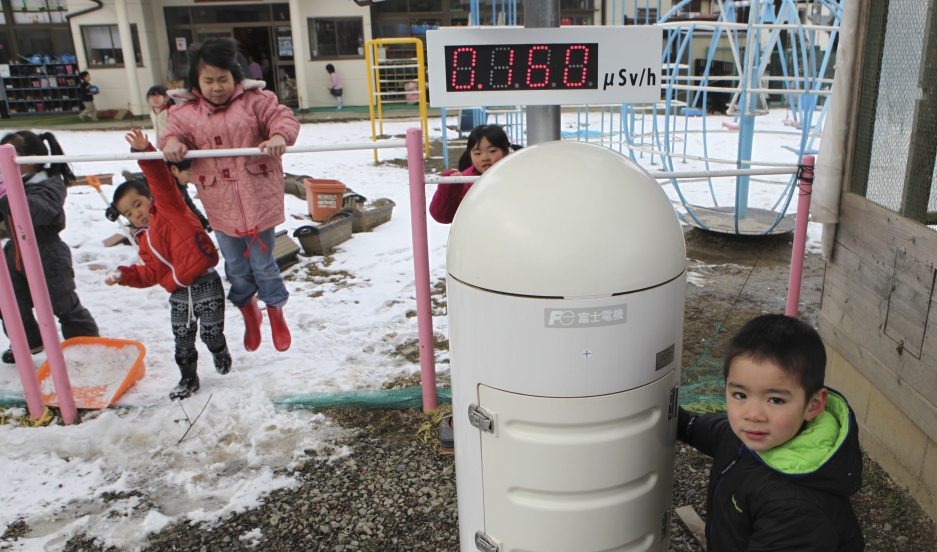
写真(福島第一原発から約30マイルの幼稚園で遊ぶ子供たち)
出典はChris Meyers/Reuters
福島県からの避難者は多かれ少なかれ悩みを抱えています。
・政府の帰還許可に従って戻れば子供を被爆させてしまう。
・避難地に留まると、子供が父親と会えない。
・避難者への金銭的援助が打ち切られてしまう。
・「除染完了」地域に素直に戻らないと「風評被害を広める気か!」と非難される。
・避難その他の精神的ストレスで家庭が崩壊し、離婚に至った。
・福島県出身者ということで将来結婚差別を受けるのでは、という心配。
・その他・・・・
発電所の分際で、これだけ多くの悩みや葛藤を人間様へもたらすのは原発くらいなものです。科学技術は人間の暮らしを豊かに楽にするための道具なのですが、人間が科学技術の奴隷になっていることに気付いていないんですね。原発マフィアは、政治家・官僚・電力会社やメーカー・御用学者・御用マスコミで構成されていますが、視野の狭さと知恵の無さ故に、再稼働へ向けて暴走しています。
原発マフィアに付ける薬はありませんが、彼らと距離を置いている人達は現場で悩んでいる人の声を受け止めて冷静に考え、原発の是非を判断する必要があります。
PRI’S The Worldが福島県出身避難民の状況を記事にしています。2015年3月11日付記事のリンクを以下に貼りました。
上記リンク英文記事の一部を以下に引用します。( )は私の日本語訳です。参考にしてください。
スポンサーリンク
「Four years since that triple disaster struck the Tohoku region of northern Japan, there are still more than 220,000 refugees from the area scattered over the country. That includes everyone who lived within an approximately 30-kilometer radius of the plant; the Japanese government ordered them out of their homes. But they weren’t the only ones who fled.」
(3基の原発事故が日本の東北地方に襲い掛かってから4年が経つが、いまだに22万人以上の避難者が全国で散り散りの生活を強いられている。日本政府は、福島原発から半径約30km内に住む住民に対して強制避難命令を出した。しかし、強制避難者以外にも避難者がいるのだ。)
「Many others, like Kazumi, lived just outside the mandatory evacuation zone. They were allowed to stay, but they figured their homes were still too close to the reactor for comfort.」
(カズミさんもその一人だが、強制避難地域の外側に暮らしていた避難者は多い。政府から避難命令は無かったが、福島原発にあまりに近いため安心できないと判断したのだ。)
「Such people are pointedly referred to as “voluntary evacuees,” and they face growing derision from the media, their communities and even the government, which wants people in the areas they’ve officially “restored” to go home. That’s why “Kazumi,” like just about every evacuee I meet, insists on using a false name.」
(指示されてないのに非難する人たちは任意避難者と呼ばれ、批判の対象となっている。メディア・地域社会、そして政府からも嘲笑される機会が増えているのだ。除染完了と認定した地域の住民が帰還することを政府は希望している。そのため、他の避難者と同じように彼女もまた「カズミ」という仮名を使わねばならないのだ。)
「Kazumi’s home in the town of Iwaki-shi is still standing. Her husband even stayed while she and her children left for Tokyo. He kept his teaching job to support the family, but “over time he got really depressed,” Kazumi says.」
(カズミさんの家はいわき市内にある。彼女と子供は東京に移ったが、夫はいわき市に留まっている。家計を支えるために教職の仕事を続けているが鬱状態になってしまったと、カズミさんは言う。)
「He would constantly measure radiation levels and warn his students that there was contamination. But after a while, she says, “people called him a liar. They’d say, ‘The government and their elite scientists say there’s nothing to worry about. Who are you to spread those falsehoods?’”」
(カズミさんの夫は継続的に放射線レベルを測定し、生徒たちに汚染の危険を知らせていた。しかし暫くして、周りから嘘つきと呼ばれるようになった。心配することは何もないと政府やエリート科学者が言っているのにデタラメを吹聴しやがって、と非難されたのだ。)
「But the Geiger counter is a machine, Kazumi points out. It doesn’t lie in the same way humans can. 」
(しかし、ガイガーカウンターという機械は人間のように嘘をつきません、とカズミさんは述べた。)
「After two years, her husband couldn’t take it anymore. He joined them in Tokyo and found a job, though no longer as a university researcher. But Kazumi says she’s lucky because her family is together. A lot of other dads stayed behind in Fukushima to support their wives and children, living the so-called hinan seikatsu — evacuee life.」
(二年後に彼女の夫は耐えきれなくなりカズミさんたちと東京で一緒に暮らすようになった。以前と同じ大学の研究職ではないが、仕事も見つけた。家族が一緒に暮らせるのは有り難い、とカズミさんは言う。いわゆる避難生活を送っている妻と子供を支える為に福島県内に留まっている父親は多いのだ。)
「The Japanese government has given Kazumi free housing for four years, but that’s supposed to end next March. She’s wracked with worries about where her family will live, especially knowing the difficult choices other Fukushima refugees have had to make: Stay and possibly get sick from radiation? Raise your kids without a dad? A lot of her friends have gotten divorced, their marriages broken by the stress.」
(カズミさんは、日本政府の計らいで4年間無料の住宅に住んできたが、それも来年3月で終わってしまう。これから家族はどこに暮らせばいいのか、彼女はとても悩んでいる。他の福島避難者が苦渋の決断をしなければならなかったのを知っているのでなおさらだ。被災地に留まって放射能に健康を害されるか?父親抜きで子ともを育てるのか?ストレスで結婚生活が破綻し離婚してしまった友達もたくさんいる。)
「Official announcements say places like Iwaki-shi are now just as safe as Tokyo. But Kazumi says she measured the radioactivity of the dirt that had piled up on her veranda last summer, and levels were still high.」
(現在のいわき市は東京と同じく安全だと政府は発表している。しかし去年の夏、カズミさんがベランダに溜まった埃の放射線レベルを測ったところ、依然として高い数字であった。)
「It’s actually not surprising that, especially recently, government numbers have been low: Government monitoring posts are frequently in places that have been paved over and cleaned, and radioactive cesium is water soluble. But children don’t play on concrete slabs, and you never know which way the wind will blow.」
(政府が発表する測定数値が最近特に低くなっているが、驚くに当たらない。政府のモニタリングポストは綺麗に舗装された地面の上に設置されることが多いし、放射性物質のセシウムは水溶性だ。しかし子供たちはコンクリートの上で遊ばないし、風がどう吹くかは誰にも判らない。)
「Last year, a popular comic Drafted a story about how kids in Fukushima were having unusual nosebleeds, linking them to radiation exposure. Government officials, including the prime minister, went out of their way to slam the comic, calling it untrue and “rude” to the people of Fukushima.」
(昨年ある人気漫画が、福島の子供が異常に鼻血を出す様子や放射性物質との関連を描いていた。総理大臣を含めた政府高官はその漫画を執拗に批判し、間違いだし福島県民に対して失礼だと述べた。)
「But experts says government efforts to move soil have been haphazard and the cleanup processes opaque. And there’s more than the nosebleeds: Thyroid cancer rates among kids in Fukushima have also spiked.」
(政府が行う土壌取り除き作業は行き当たりばったりだし除染工程も不透明だ、と識者たちは言う。症状だって鼻血だけではない。福島県の子供の甲状腺癌罹患率も激増しているのだ。)
「“There is no level of extra radiation that is safe.”」
(放射能をこれだけ余分に浴びても大丈夫、という基準は無い。)
「So until the town is returned to the way it was, Kazumi doesn’t want to go back — even as she acknowledges it probably won’t happen in her lifetime.」
(町が元通りになるまでカズミさんは帰還したくないと言う。彼女が生きている間に町が元通りになることはないだろうと思っているが・・・。)
「She and other parents also worry about future discrimination if people find out where their kids are from. Fukushima, she points out, has become infamous, just like Chernobyl. “Who wants to marry someone possibly tainted by radiation?” she wonders.」
(子供の出身地を知られたら差別されるのではと、彼女を含めた親たちは心配している。チェルノブイリと同じく福島は悪名高い場所になってしまった、と彼女は言う。「放射能で健康を害しているかもしれない人と結婚したいとは思わないでしょう?」)
「Kazumi’s eldest son recently had his elementary school graduation essay rejected. He wrote about his misgivings about where the government is taking the country.」
(最近カズミさんの長男は卒業文集を書いたが、通っている小学校から受け取りを拒絶された。政府方針に疑問を呈する内容を書いたからだ。)
「His teacher was nice about it, he says. She said she’d work with him to rewrite the essay so that it wasn’t critical of the government. But “criticism of the government was at the core of the essay,” he says. He’s not going to hand in a watered-down version. He’ll turn in something else.」
(先生は褒めてくれたんだ、と長男は言う。政府批判にならないように、息子と文集を書き直しますと、カズミさんは言った。だけど政府批判こそがその文集の目的だったんだ、と長男は述べた。彼には表現を変えたものを提出する気はなく、別のものを出すつもりだ。)
「When I ask him what he wants to be when he grows up, he doesn’t miss a beat. “I want to be a member of Parliament,” says the precocious 12-year-old. “I want to change Japan.”」
(その大人びた12歳の長男に将来何になりたいか尋ねたら、間髪入れずに答えてくれた。「僕は国会議員になって日本を変えたい。」)
以上
貴重な記事ですね 有り難うございます
FBでシェアさせて頂きました
この小学生の受け取り拒否された文 読みたいです
赤羽様
コメント有難うございます。ブログ投稿の励みになります。
今後ともよろしくお願いいたします。
J Iwasaki